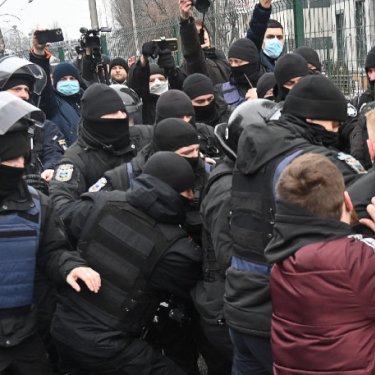Ukraine escalates “information war” by banning three pro-Kremlin media

Reporters Without Borders (RSF) is concerned about a Ukrainian decree stripping three “pro-Kremlin” TV channels of their licences for the next five years. RSF worries about an abuse of the government’s power to impose sanctions that could lead to an increase in partisan tension and calls on the
authorities to respect their international obligations.
Читать на русском / Read in Russian
The decree escalating the “information war” between Moscow and Kiev by rescinding the broadcast licences of 112 Ukraine, NewsOne and ZIK took effect as soon as it was signed by President Volodymyr Zelensky on 2 February. Issued by the National Security and Defence Council after the opening of an investigation by the Security Service of Ukraine (SBU) into “financing terrorism,” the decree uses provisions in article 4 of Ukraine’s sanctions law for economic sanctions in cases of “participation in terrorism.”
The three TV channels, whose combined ratings amount to only 1% of the country’s viewers, are all owned by an ally of the pro-Kremlin oligarch Viktor Medvedchuk.
“We deplore this escalation in the information war,” said Jeanne Cavelier, the head of RSF’s Eastern Europe and Central Asia desk. “Even if the desire to combat propaganda is legitimate, it does not justify the use of censorship, and banning these TV channels is liable to stir up violence against journalists. This violation of freedom of expression violates Ukraine’s international obligations. We urge the authorities to find other ways to preserve news media independence and pluralism.”
Media and journalists are increasingly the victims of partisan conflict and growing polarization in Ukrainian society. Two days after this decree was signed, Serhiy Sternenko, the former regional head of the political party Pravy Sektor in Odessa, called for the publication of all the data of the journalists working for the three channels. Moreover, in response to a call from this movement, Ukrainian nationalists gathered in Kiev outside the headquarters of Nash TV, another channel regarded as being pro-Kremlin, and demanded its closure.
Two of the TV channel’s reporters were attacked during the ensuing altercations. Reporter Oleh Nechay was hit after his microphone had been snatched from him while he was doing a live report. And demonstrators roughed up Aleksei Polchunov. Deputy interior minister Anton Gerashchenko responded to the attacks by ordering criminal investigations into the obstruction of journalists’ work.
On the 25th February, a Kiev court ordered Internet access providers to block access to 426 websites, including the Russian version of RBC.ru, in response to a complaint by a businessman who accused them of publishing hostile information about him. The police quashed the complaint later in the day, while the prosecutor-general’s office opened an investigation into the allegations.
A decree signed by then President Petro Poroshenko in May 2017 ordered the immediate blocking of leading social media and at least 19 Russian news sites.
Ukraine is ranked 96th out of 180 countries in RSF's 2020 World Press Freedom Index



